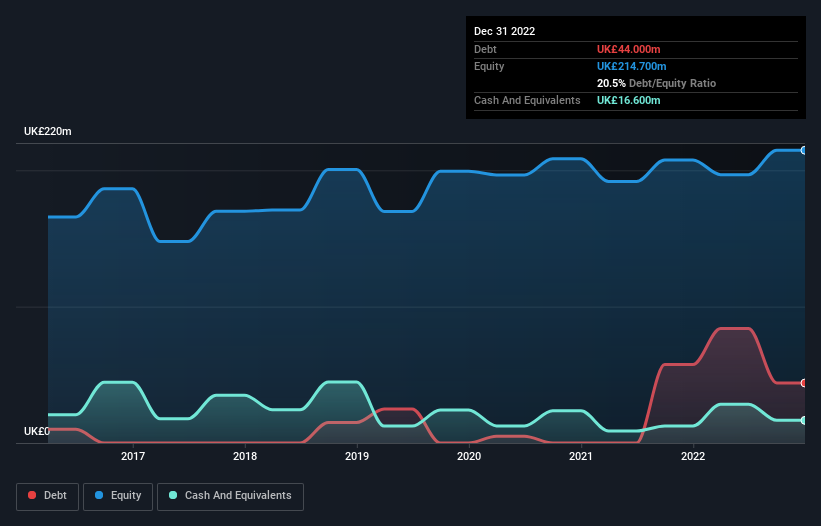Is Moneysupermarket.com Group (LON:MONY) Using Too Much Debt?
Warren Buffett famously said, 'Volatility is far from synonymous with risk.' It's only natural to consider a company's balance sheet when you examine how risky it is, since debt is often involved when a business collapses. As with many other companies Moneysupermarket.com Group PLC (LON:MONY) makes use of debt. But the real question is whether this debt is making the company risky.
What Risk Does Debt Bring?
Debt assists a business until the business has trouble paying it off, either with new capital or with free cash flow. If things get really bad, the lenders can take control of the business. While that is not too common, we often do see indebted companies permanently diluting shareholders because lenders force them to raise capital at a distressed price. Of course, the upside of debt is that it often represents cheap capital, especially when it replaces dilution in a company with the ability to reinvest at high rates of return. When we examine debt levels, we first consider both cash and debt levels, together.
See our latest analysis for Moneysupermarket.com Group
How Much Debt Does Moneysupermarket.com Group Carry?
As you can see below, Moneysupermarket.com Group had UK£44.0m of debt at December 2022, down from UK£57.5m a year prior. However, it does have UK£16.6m in cash offsetting this, leading to net debt of about UK£27.4m.

How Healthy Is Moneysupermarket.com Group's Balance Sheet?
We can see from the most recent balance sheet that Moneysupermarket.com Group had liabilities of UK£114.3m falling due within a year, and liabilities of UK£80.2m due beyond that. Offsetting this, it had UK£16.6m in cash and UK£63.5m in receivables that were due within 12 months. So it has liabilities totalling UK£114.4m more than its cash and near-term receivables, combined.
Of course, Moneysupermarket.com Group has a market capitalization of UK£1.31b, so these liabilities are probably manageable. But there are sufficient liabilities that we would certainly recommend shareholders continue to monitor the balance sheet, going forward.
In order to size up a company's debt relative to its earnings, we calculate its net debt divided by its earnings before interest, tax, depreciation, and amortization (EBITDA) and its earnings before interest and tax (EBIT) divided by its interest expense (its interest cover). The advantage of this approach is that we take into account both the absolute quantum of debt (with net debt to EBITDA) and the actual interest expenses associated with that debt (with its interest cover ratio).
Moneysupermarket.com Group has a low net debt to EBITDA ratio of only 0.28. And its EBIT easily covers its interest expense, being 25.4 times the size. So we're pretty relaxed about its super-conservative use of debt. Also good is that Moneysupermarket.com Group grew its EBIT at 16% over the last year, further increasing its ability to manage debt. The balance sheet is clearly the area to focus on when you are analysing debt. But ultimately the future profitability of the business will decide if Moneysupermarket.com Group can strengthen its balance sheet over time. So if you want to see what the professionals think, you might find this free report on analyst profit forecasts to be interesting.
Finally, while the tax-man may adore accounting profits, lenders only accept cold hard cash. So the logical step is to look at the proportion of that EBIT that is matched by actual free cash flow. During the last three years, Moneysupermarket.com Group generated free cash flow amounting to a very robust 88% of its EBIT, more than we'd expect. That puts it in a very strong position to pay down debt.
Our View
Moneysupermarket.com Group's interest cover suggests it can handle its debt as easily as Cristiano Ronaldo could score a goal against an under 14's goalkeeper. And that's just the beginning of the good news since its conversion of EBIT to free cash flow is also very heartening. Considering this range of factors, it seems to us that Moneysupermarket.com Group is quite prudent with its debt, and the risks seem well managed. So the balance sheet looks pretty healthy, to us. When analysing debt levels, the balance sheet is the obvious place to start. However, not all investment risk resides within the balance sheet - far from it. For instance, we've identified 1 warning sign for Moneysupermarket.com Group that you should be aware of.
At the end of the day, it's often better to focus on companies that are free from net debt. You can access our special list of such companies (all with a track record of profit growth). It's free.
New: Manage All Your Stock Portfolios in One Place
We've created the ultimate portfolio companion for stock investors, and it's free.
• Connect an unlimited number of Portfolios and see your total in one currency
• Be alerted to new Warning Signs or Risks via email or mobile
• Track the Fair Value of your stocks
Have feedback on this article? Concerned about the content? Get in touch with us directly. Alternatively, email editorial-team (at) simplywallst.com.
This article by Simply Wall St is general in nature. We provide commentary based on historical data and analyst forecasts only using an unbiased methodology and our articles are not intended to be financial advice. It does not constitute a recommendation to buy or sell any stock, and does not take account of your objectives, or your financial situation. We aim to bring you long-term focused analysis driven by fundamental data. Note that our analysis may not factor in the latest price-sensitive company announcements or qualitative material. Simply Wall St has no position in any stocks mentioned.
About LSE:MONY
MONY Group
Engages in the provision of price comparison and lead generation services through its websites and applications in the United Kingdom.
Very undervalued with outstanding track record and pays a dividend.
Market Insights
Community Narratives



